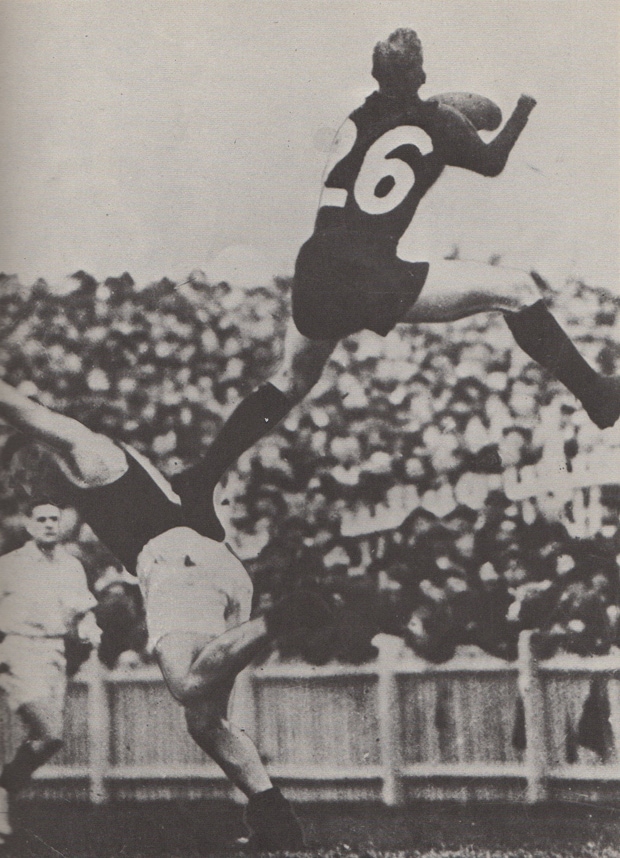Lieutenant James William Park
2/6th Infantry Battalion
Died Wau, New Guinea, February 9, 1943,
aged 32
128 games for Carlton, 1932-’40
Premiership player 1938
Victorian representative 1938
For many years at Princes Park, a faded sepia photograph of Jim Park hung from the old brick walls of the players’ changerooms deep within the bowels of the Robert Heatley Stand.
The iconic photo, captured by a newspaper “snapper” at Princes Oval in the 1930s, swiftly earned iconic status. Taken from behind, the image features Jim completing an extraordinary chest mark - his left foot planted firmly on the spine of his hapless Melbourne opponent Eric Glass, his right leg extended outward to retain balance.
“We used to look at that photo, in the club, of Jim Park, who was a full-back for Carlton in the time of Rod McLean and those fellows,” said the late Jim Clark, this club’s two-time Premiership player and Best and Fairest.
“It was a famous photo of him taking a mark with his foot in the back of ‘Tarzan’ Glass . . . it was a famous one, published around the world it was.”
Jim Clark made his senior debut with Carlton in 1943 – the same year four of the club’s five former players paid with their lives through the course of the Second World War.
One of them was Lieutenant James William “Jim” Park, killed by the invading Japanese in the defence of a strategic Allied airfield in New Guinea.
Less than five years previous, in the 1938 Grand Final, Jim had quelled the substantial influence of Collingwood full-forward Ron Todd, and was a revered figure for those who followed the Carlton team, Clark amongst them.
At Carlton, Jim carried the No.26 on his back. That number, now sported by Jayden Foster, was handed to Clark not long after the grim news was received from New Guinea.

The mark. (Photo: Carlton Football Club)
“About a month after Jimmy Park was killed in the war, Mr. Bell, the secretary, came over to me in the clubroom and said ‘Jim, we’re going to take your number off you that you’ve got and give you Jimmy Park’s number,” Clark recalled.
“Talk about an honour. To be given Jimmy Park’s number out of respect for Jimmy Park was an honour that was hard to believe.”
Jim Park was born in Bendigo, the third son in a large family of four sons and three daughters. His father, Dr. Alexander Park, moved practice to Moonee Ponds in 1919 to provide better education opportunities for his children.
Jim was educated at Melbourne’s exclusive Scotch College, and later at Dookie Agricultural College. An outstanding student and a gifted athlete, he soon came to the notice of Carlton’s ever-attentive talent scouts.
Jim’s career with Carlton opened with his senior debut in the 4th round of 1932, against Hawthorn at Princes Park. Standing just under six feet (183 cm), Jim was a natural defender whose pace, anticipation and spring only enhanced his on-field versatility.
Season ’33 saw Jim liner up at centre half-back, before an injury to captain Frank Gill warranted his relocation to the last line of defence. When Gill returned for the Round 17 Melbourne contest, Jim crossed to the pocket and was a revelation there. From then on, the Gill-Park combo was a fixture in the Blues’ last line.
In 1938, Jim represented the Victorian state team, then played a pivotal role in Carlton’s long-awaited sixth Grand Final victory, keeping the Magpies’ champion Todd to just three goals.
While studying at Scotch College, Jim had joined the school’s Army Cadet Corps. Afterward, he transferred to the Militia (the forerunner to the modern Army Reserve) and continued his involvement throughout his time at Carlton.
In September 1939, when Australia supported Great Britain by declaring war on Germany, Jim held the rank of Lieutenant with the 32nd Infantry Battalion. Like so many other Australians, he did not hesitate to volunteer. He turned out for his last Carlton game against Footscray at Princes Park in the final round of 1940, then enlisted with the 2nd Australian Imperial Force in March the following year.
Jim was confirmed in his rank of Lieutenant, and posted to the 2/6th Infantry Battalion. After completing his final training, he was ferried to the Middle East with his unit. But when the Japanese invaded New Guinea early in 1942, he was amongst the Australian troops recalled and sent straight into the thick of the battle to halt the Japanese drive to Port Moresby.
At Wau, on February 9, 1943, 32 year-old Lieutenant James William Park was killed while leading his men into action.
He left behind his beloved wife Marjorie and infant daughter Joan.
On May 8, 1943, before the commencement of the first match of the season at Princes Park, the Carlton and Richmond teams, their respective club committees and a solemn group of supporters, observed a minute's silence to the memory of a man widely known as ‘Gentleman Jim’.
A lone bugler then played the last post.
Later, The Sporting Globe Football Annual best articulated the widespread sorrow of the football community with this tribute;
“Jim Park had the admiration of officials, players and supporters alike at Carlton, for he played the game hard and fairly. He asked no quarter from anyone and he gave none. Yet with all his battling, he was scrupulously fair - a gentleman on and off the field.”
It takes courage to step onto a football ground and play the greatest game of all. It takes even more courage to put your life on the line to serve your country.
Jim Park was one such man.


